As a late comer to our enterprise SAS SSD roundup we have the Toshiba PX02SMU080 800GB drive. By far, it is the fastest SAS SSD in our roundup. We did need to utilize a SAS3 controller with the Toshiba PX02SMU080 because it proved too much for mere 6.0gbps controllers to handle. Here is the fun part: a single drive running in single-ported mode can reach sequential read speeds that saturate a 10gbps Ethernet link. Speed is only one component of this drive. Toshiba pushes this much performance using eMLC NAND. eMLC is a higher-quality MLC NAND variety that has significantly more write endurance than consumer SSD NAND. Enough that this drive is rated at 10 full disk writes per day for 5 years or 14.6PB written which is comparable to Intel’s high-end DC P3700 800GB PCIe card. This is in-part due to over-provisioning. The drive has 1TB of raw NAND onboard and with over 200GB spare area, wear leveling algorithms plus high-end eMLC flash memory yield exceptional endurance. We are running this drive through our standard benchmark suite so we can compare it with other drives.
We are continually growing this data set but here are the quick benchmark runs thus far:
Single SAS SSD Benchmarks
- Pliant/ SanDisk Lightning 206s 200GB SLC SAS SSD benchmarks
- Seagate Pulsar.2 200GB MLC SAS SSD benchmarks
- Pliant/ SanDisk Lightning 406s 400GB SLC SAS SSD benchmarks
- Smart Storage System/ SanDisk Optimus 400GB MLC SAS SSD benchmarks
- Samsung SM1625 200GB SAS SSD benchmarks
2 Drive RAID 0 Benchmarks
- 2x SanDisk Lightning 206s 200GB SAS SSD benchmarks
- 2x Seagate Pulsar.2 200GB SAS SSD benchmarks
- 2x Smart Storage System/ SanDisk Optimus 400GB MLC SAS SSD benchmarks
- 2x SanDisk Lightning 406s 400GB SAS SSD benchmarks
- 2x Samsung SM1625 200GB SAS SSD benchmarks
Our goal is to continue posting one more per week in-between other articles. We are also working on being able to add NVMe based SSDs to this as a comparison to state-of-the-art NAND storage. More on that shortly.
Test Configuration
Since we are going to assume the use of already released hardware, we are using a legacy system for testing across the test suite:
- Motherboard: Gigabyte GA-7PESH3
- Processors: Dual Intel Xeon E5-2690 (V2)
- SAS Controller: LSI SAS 3008
- RAM: 64GB DDR3L-1600MHz ECC RDIMMs
- OS SSD: Kingston V300 240GB
We are using a SAS controller so one cannot compare results directly to consumer-driven setups where a SATA SSD is connected to an Intel PCH port. There is a latency penalty for going over the PCIe bus to a controller to SAS. It also is a reason NVMe is going to be a game changer in the enterprise storage space.
Toshiba PX02SMU080 800GB SSD Quick Benchmarks
For our quick tests during this part of the series we will just provide the quick benchmarks with only a bit of commentary. The results should be fairly straightforward and the index of previous articles in this series (linked above) is a good resource to compare against.
AS SSD Benchmark
AS SSD is a solid benchmark that does not write compressible data to drives. The result is perhaps one of the best workstation SSD benchmarks available today.
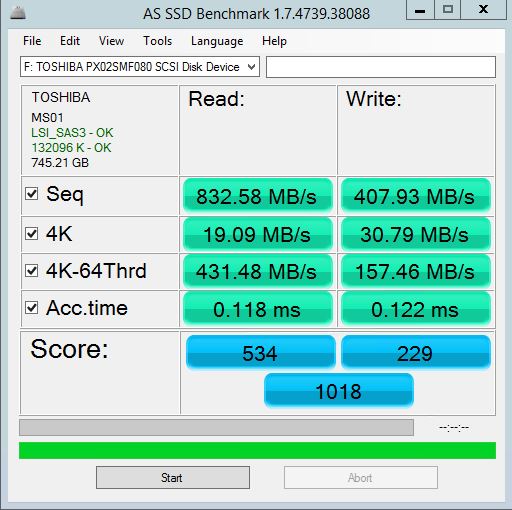
Here we see sequential read performance significantly exceeding what was possible with SAS2 6.0gbps drives that were practically limited to around 550MB/s in single port configurations. Overall solid performance comparable to many of the 6.0gbps SAS2 SSDs we have tested recently.
CrystalDiskMark
CrystalDiskMark is another benchmark which gives non-compressible read/write numbers. This is in contrast to the ATTO Benchmark used by LSI/ Sandforce and its partners when they market a given solid state drive.
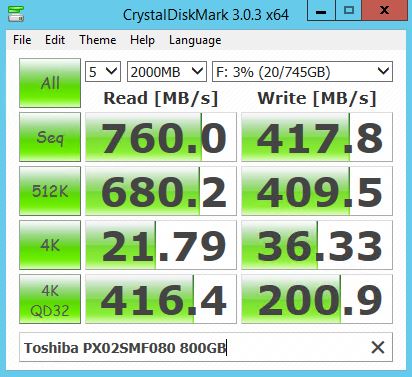
CrystalDiskMark shows sequential read speeds again well into the territory where SAS3 becomes a necessity. One can also see solid 4K QD32 speeds. Toshiba advertises 410MB/s write speeds which we seem to be confirming.
ATTO Benchmark
The value of the ATTO benchmark is really to show the best-case scenario. ATTO is known to write highly compressible data to drives, which inflates speeds of controllers that compress data like LSI/ SandForce does prior to writing on a given solid state drive.
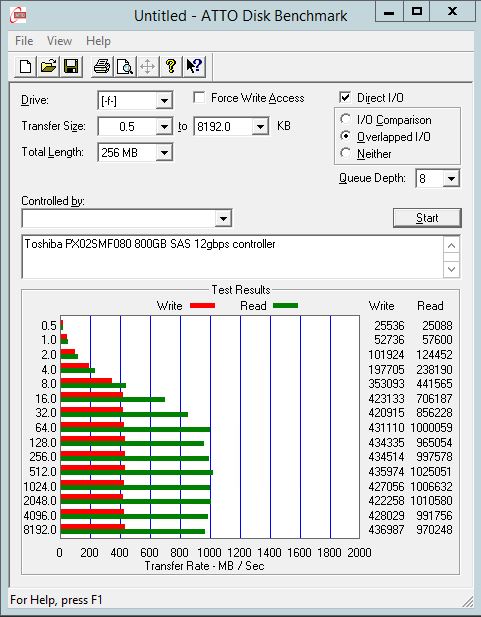
In terms of ATTO we can finally see sequential “best case” read speeds in excess of 1GB/s. Toshiba says that sustained reads fall into the 910MB/s range for the drive but this is still solid performance. The write speeds are again in the range we expect from the spec sheet.
Conclusion
The Toshiba PX02SMU080 800GB 12gbps SAS3 SSD performed extremely well in our quick benchmarks. Utilizing eMLC NAND for over 1GB/s sequential read performance and 10 full drive writes/day is particularly impressive. It compares well to the Intel DC P3700 series especially when one considers that these drives are dual ported for high-availability architectures and use 2.7w in normal operation. These are absolutely great drives.

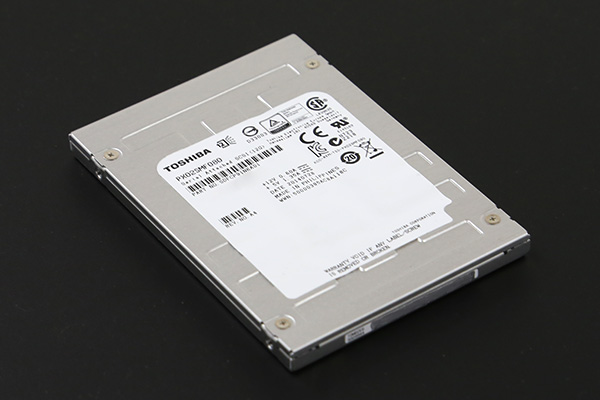


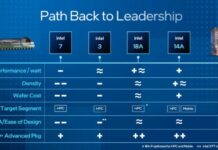
Looking good so far. These are well regarded drives and now I know why.
Just found an awesome drive: PMC Sierra’s new NV1600 series NVMe NVRAM, 4GB/8GB/16GB PCI-e 3.0 x8 1million IOPS in NVMe 4k block mode, and 10million IOPs in direct memory access mode.
http://pmcs.com/products/storage/flashtec_nvram_drives/
Patrick, can you get your hands on one of those and benchmark this sucker? I believe I have just found the best ZIL(until DDR4 NVDIMM get block mode access). I wonder how much those cost. Either way, Christopher George is fubar’d.
> “We did need to utilize a SAS3 controller with the Toshiba PX02SMU080 because
> it proved too much for mere 6.0gbps controllers to handle.”
It will be amazing in a few years when SSDs are even smaller and faster. Instead of relying on SAS we could use the JEDEC DDR4 Sockets (with memory bandwidth to up to 17 GB/s) and simply plug the SSD into the RAM Socket.
A memory mapped SSD Drive running at DRAM speeds, it’s got to be good for something !
The PMC FlashTec cards look very interesting “Sub-microsecond Latency”, seems like they are claiming 100 nanoseconds – wow. You might be right that this is trouble for Christopher George’s DDRdrive since NVMe is supported in Linux 3.3+. But one thing the DDRdrive seems to still have going for it is a well tested Solaris/Illumos driver. Regardless in ZFS use of a SLOG for ZIL will only help synchronous writes. But at 100 nanoseconds it might make sense to carve out 4 ZILs serving 4 drive sets on the same FlashTec card. BTW I read that the est. cost is between $1,000 to $2,000 for the 16GB model.